New sleep recommendations may encourage people to stay in bed for an extra hour or two, as experts have updated guidelines for the ideal amount of sleep for each age group.
There are three categories for the adult section, including younger adults, adults and older adults. Thirteen organizations have conducted rigorous research on just how to determine how much rest is needed for certain groups.
The new recommendations are as follows, courtesy of the health organization.
• Newborns (0-3 months): 14-17 hours (previously, 12-18 hours)
• Infants (4-11 months): 12-15 hours (previously, 14-15 hours)
• Toddlers (1-2 years): 11-14 hours (previously, 12-14 hours)
• Preschoolers (3-5): 10-13 hours (previously, 11-13 hours)
• School age children (6-13): 9-11 hours (previously it was 10-11)
• Teenagers (14-17): 8-10 hours (previously it was 8.5-9.5)
• Younger adults (18-25): 7-9 hours (new age category)
• Adults (26-64): 7-9 hours (remains the same)
• Older adults (65+): 7-8 hours (new age category)
The recommendations also include different levels that define appropriate recommendations, including (a) recommended; (b) maybe appropriate for some individuals; or (c) not recommended.
“This is the first time that any professional organization has developed age-specific recommended sleep durations based on a rigorous, systematic review of the world scientific literature relating this duration to health, performance, and safety,” said Charles A. Czeisler, PhD, MD, NSF chairman of the board, chief of sleep and circadian disorders at Brigham and Women’s Hospital, and Baldino Professor of Sleep Medicine at the Harvard Medical School, in a release. “The National Sleep Foundation is providing these scientifically grounded guidelines on the amount of sleep we need each night to improve the health of the millions of individuals and parents who rely on us for this information.”
As sleep disorders–including sleep deprivation and insomnia, along with others, remain relatively common among many Americans-the recommendations can help health officials in guiding individuals with better diet, exercise and potentially sleep aids that may help support better sleep patterns and/or habits.
Close to 20 percent of Americans still report that they get less than 6 hours of sleep on average when most should be getting close to 8 or more, as seen above.
Agencies/Canadajournal
 Canada Journal – News of the World Articles and videos to bring you the biggest Canadian news stories from across the country every day
Canada Journal – News of the World Articles and videos to bring you the biggest Canadian news stories from across the country every day



